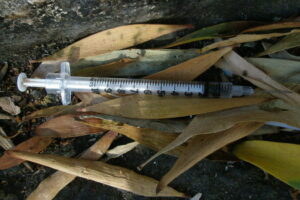Boundaries are often sorely lacking in alcoholics/addicts. Nor do boundaries develop effortlessly or automatically in early Recovery. They must be worked on diligently with the help of a sponsor and the Steps.
Rather than attempt to define what boundaries are, I will give several examples which are of the utmost importance in establishing a viable Recovery. Boundaries are a huge multifaceted topic. This blog is just an outline.
Learning to stay away from toxic people (who may represent relapse triggers) is one of the most important survival skills in Recovery. Many relapses occur because a boundary was not established in the first place between the recovering addict and the toxic person.
More generally: standing up for oneself by being direct and assertive with people, learning to stop being a doormat for family and friends – these are some of the hardest things to learn in Recovery. But learning how to do this successfully is very rewarding: self-esteem is enhanced, depression and anxiety subside as self-worth sets in, all as a result of establishing boundaries with others.
Boundaries also include one’s own personal behaviours: it is necessary, especially in early Recovery, to draw up a list of personal behavioural boundaries. One possible example of this (especially in early Recovery): I will not drive or walk by the liquor store.
Learning to say “no” is very useful in establishing boundaries. “No” is a complete sentence. It is useful in setting limits to the expectations other people have of you. Learning to say “no” consistently, repeatedly (if necessary), clearly and firmly is one of the hallmarks of Recovery. By learning to say “no” to others, our “yes” responses become more valued and respected.
Boundaries apply especially to health professionals. “Unofficial” corridor consultations and requests for medical advice at parties and social functions are a constant and annoying example of boundary violations perpetrated on health professionals every day. Health professionals with or without the disease of addiction are particularly “people-pleasing” and codependent. It is important for any health professional (but especially one in Recovery) to devise techniques of politely but assertively deflecting such attempts to violate professional boundaries.
Boundaries are also at play when an addict/alcoholic has to decide when and whether to disclose his/her illness to someone. This is discussed in Blog 26. Always first discuss this kind of disclosure with your sponsor and others in Recovery. One’s medical condition, its privacy and confidentiality, is a boundary!
Abusive upbringings and relationships are examples of boundary violations (particularly prevalent in the community of alcoholics/addicts) and can only be corrected or remedied in
Recovery by establishing firm, rock-solid boundaries and clear consequences and actions when those boundaries are breached. Some stepwork here (particularly Steps 4-7) with the help of one’s sponsor can be particularly useful.
In essence, boundaries represent how we (recovering addicts/alcoholics) would like to interact with people and how they should interact with us. Set the rules. Set the parameters. Put a stop to other people’s negativity and boundary violations. Do not hesitate to dissociate from them, if necessary. Your Recovery is more important than anything else.
Stay away from people who are triggers to relapse. Such people are the most extreme representatives of boundary violations.
The next Blog deals with sponsorship. This is an excellent example of potential boundary issues and will be dealt with separately.




Leave a Reply